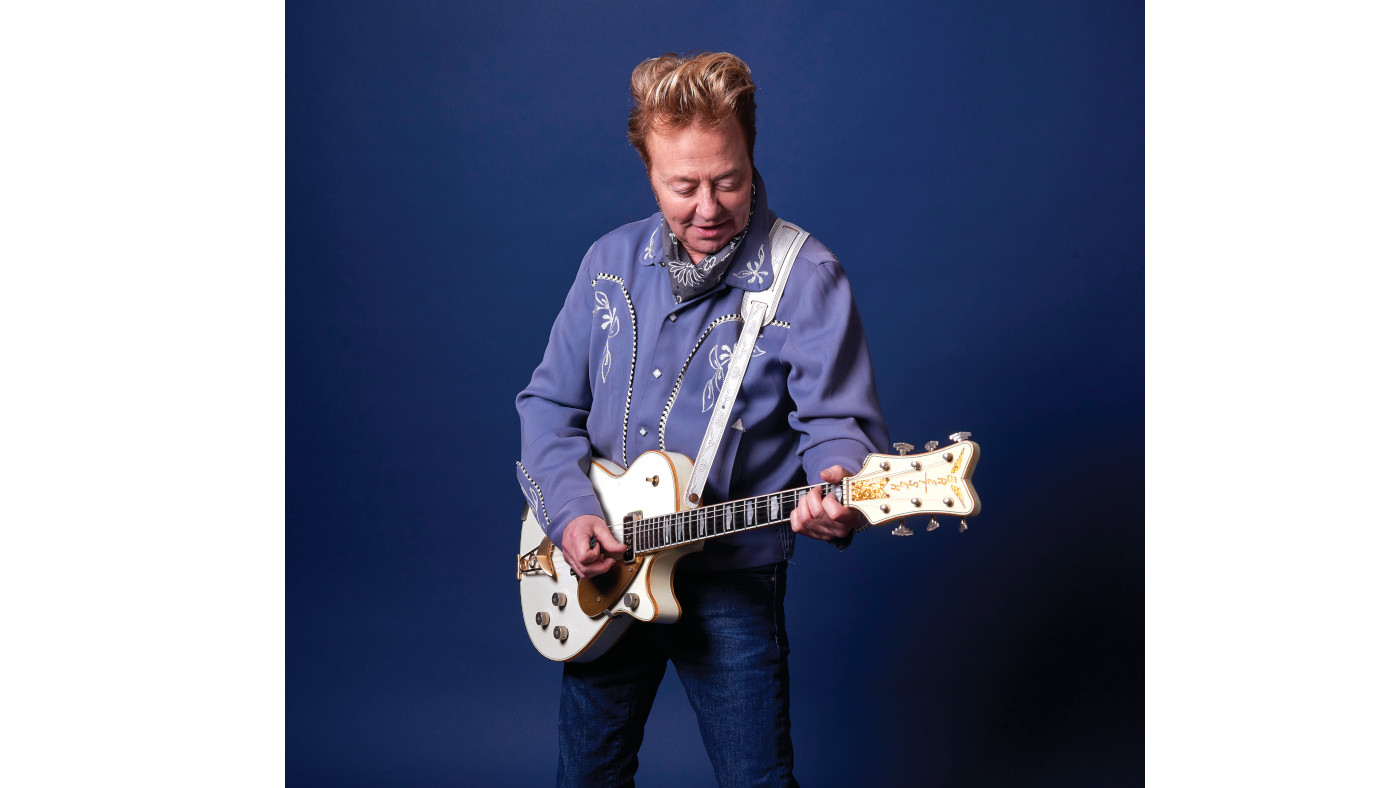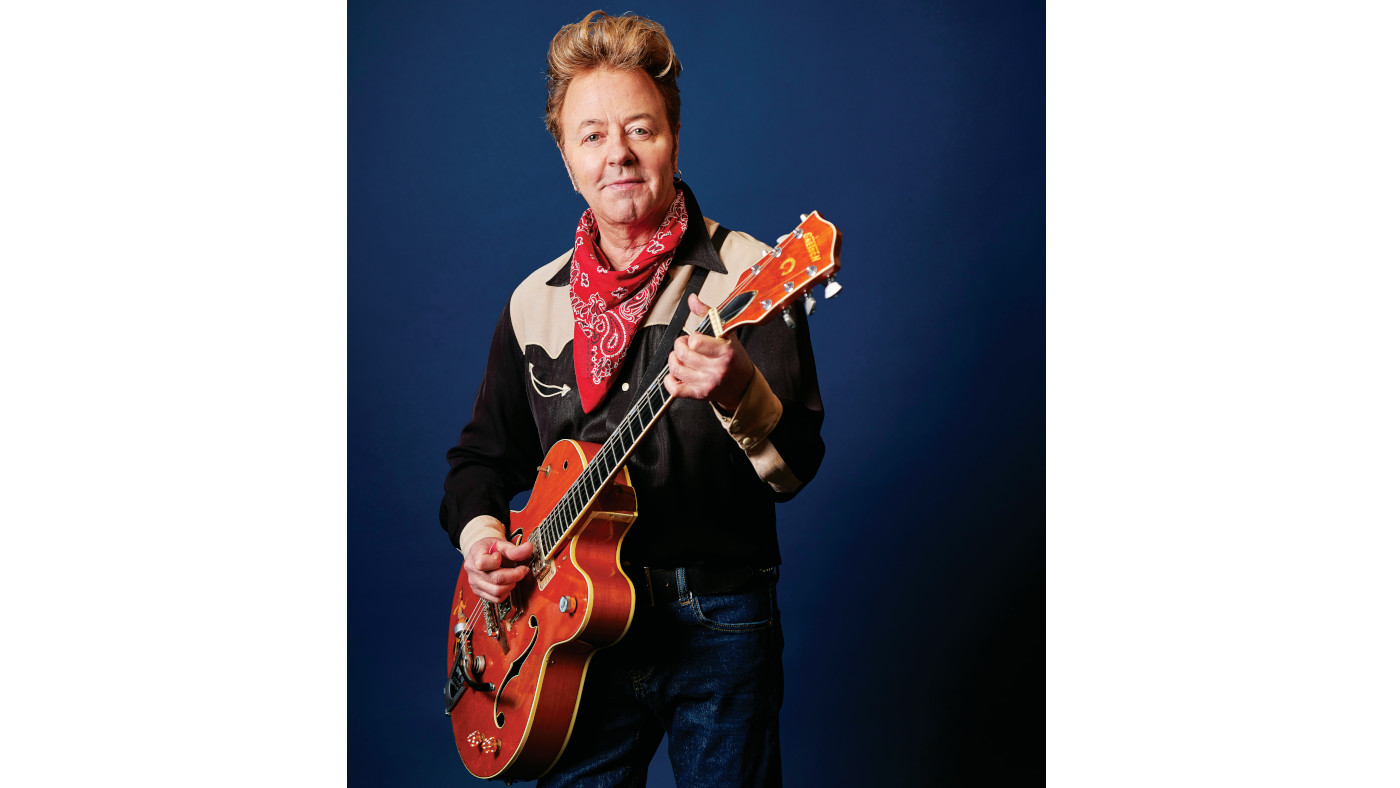Brian Setzer: “It was a combination of balls and stupidity... Naivety is a nicer way of putting it”
The Stray Cat on the band's 40th anniversary and his beloved Gretsch guitars

The undisputed king of rockabilly guitar on the Stray Cats’ 40th anniversary record, the rebirth of Gretsch, and the old orange guitar that’s been his sparring partner for 45 years...
During the 40 years since he first formed the Stray Cats with bassist Lee Rocker and drummer Slim Jim Phantom, Brian Setzer has become a guitar icon. Setzer not only kept roots guitar alive in an era of shred and synth pop, he reinvented big-band swing and helped reboot Gretsch.
Earlier this year, Brian and the Cats returned with 40, a Nashville-recorded anniversary marking studio album with all the piss and vinegar of their Dave Edmunds-produced self-titled 1981 debut. The Runaway Boys might be all grown up these days, but they still have that unmistakable Cat class and Cat style...
You couldn’t have picked a better moment to record a new Stray Cats album...
“Well, we couldn’t let 40 years go by. You don’t want to call an album ‘41’! We had to commemorate it somehow.”
It’s been 26 years since you guys were last in a recording studio together...
Of course, I used my mainstays. That’s the ’62 Fender Bassman, Roland RE-301 Space Echo and my ’59 Gretsch
“Everyone’s playing right up to the max. I wasn’t worried about that. The whole thing is writing the songs. That’s always the gold to me. Where are we gonna get the songs? How am I gonna write them?” Is it strange switching from bandleader to band member? “It is different. You just nailed it. First of all, it’s not a guitar record. I don’t wanna just come up with guitar things; it’s not about just me. It’s a band. I’m not the boss; it’s a democracy. You have to call everyone on every little thing... which can some times gum up the works. If it’s a band, it’s about everyone. It wasn’t difficult, but I’d been working by myself for 20 years.”
Get the MusicRadar Newsletter
Want all the hottest music and gear news, reviews, deals, features and more, direct to your inbox? Sign up here.
Did you consider asking Dave Edmunds to produce the record for old time’s sake?
“I’ve been talking with Dave - I almost got him! He just had a lot going on. [Nashville -based 40 producer] Peter Collins is every bit as good. He understands echo and twang and reverb, that’s the main thing.”
What gear did you use on 40?
“Of course, I used my mainstays. That’s the ’62 Fender Bassman, Roland RE-301 Space Echo and my ’59 Gretsch. That’s the meat and potatoes. I also really like the sound of this Gretsch Hot Rod I’ve got - it’s the green sparkle one. It’s got a really nice thin sound. People think a thin sound is not good, [but] I equate a thin sound to ‘cutting’. I used it on Desperado, that surf track on the album. I also used a Fender Reverb, and an old Supro amp on a couple of tunes on 40.”
Echo complex
You have a big collection of Roland Space Echo machines...
“Yes, but I also used an Echoplex, a really old one. It’s number 10. I got it fixed, got it down to Nashville. It sounded great. Halfway through recording a song, it just stopped. It sounds great when it works, but I’ve never been able to take an Echoplex on the road. They break if you look at them the wrong way.”
Your lead work on 40 is as jaw-dropping as ever. How much of it is improvised?
When I need a little more gain, a little more overdrive, I just position the guitar in front of the amp
“That’s a good question. I would say it’s 50/50. There’s a song on the new record called Three Time’s A Charm - I wrote that for Jim because he wanted a Gene Vincent feeling track. That solo, I thought out. I was coming up with something like, ‘Oh, yeah, this is really good. Then I’ll go there. I don’t want to improvise this one.’ So that was one that was figured out. Sometimes it’s different. You just rock it and you don’t want it to be too complicated. Sometimes simple is better.”
What about your lead on a classic such as Stray Cat Strut?
“It’s hard to think back almost 40 years and remember exactly what I did. I can tell you that I probably had a couple of licks I wanted to use. Like that crazy diminished thing I made up [plays solo]. I probably had it in the back of my head. It was probably half and half. I wanted to use that diminished thing. Then there’s that augmented thing I play also [picks intro lick]. I wanted to use those two things in a solo and really shake it up.”
Do you still use an Ibanez Tube Screamer?
“No. When I need a little more gain, a little more overdrive, I just position the guitar in front of the amp. The hollow body has so many overtones and different sounds to it that you can just stand in a different place and get more of an overdrive. If I want a little more twang, I just move away from the amp. That’s why the hollow body is the only thing I can play.”
How would you describe your tone on 40?
“It’s that sound me and Dave Edmunds always talked about, that strong clean sound. I don’t want too much sustain or overdrive, I want to get it just to the point of break-up. Other guitarists always want more sustain, I don’t. It gets too distorted and makes things muddy. But if the amp’s not loud enough, it sounds plinky.”
This year also marks the 30th anniversary of Gretsch shifting production to Japan. You were instrumental in that rebirth...
“Well, I think I helped steer them on the right track as far as putting the guitars back on line...”

Gretsch guru
It was seen as quite a controversial move for an iconic American brand to make at the time...
“I didn’t even think about that. I just wanted the guitars to be built right. The only way I can tell is when I get it and play it. I go by feel and sound. Even to this day, if a volume pot is in a different spot, I don’t even notice things like that...”
And we had you pegged as a detail freak!
I’m not one to leave them in the case. I like old guitars and I collect them, but only ones that I play
“You know what I just noticed... Listen to this. It’s the craziest thing. On my original Stray Cats 6120, in the case there’s a banner that says ‘Gretsch’. I’ve owned the guitar, I hate to tell ya, 45 years now. Anyway, I opened the case the other day and I looked at the banner. There was someone’s name written on it! I’d never noticed it. I just never look in there like that. I’m always in a hurry to get the strap on the guitar, or grab some picks out of the little compartment. And I go, ‘Oh for crying out loud... ‘Warren Reid’!’ So I looked up the name. No luck. I thought I’d come up with the original owner. I never told anybody that before. Isn’t that funny? All these years, I’ve just never noticed it.”
How’s your original G6120 holding up?
“It hasn’t been out of the house in years. I’m trying to get it back together for the Stray Cats tour. It plays great, it just needs a little work on the Bigsby. I’m a little hesitant to work on it, because you can’t just toss the spring and put another one in. All the original stuff is on that guitar.”
Maybe it’s earned its retirement...
“Yeah, but you gotta use the things. I’m not one to leave them in the case. I like old guitars and I collect them, but only ones that I play. I don’t have them to just sit in the case. I don’t think it’s worth it.”
Your 6120 is one of the great survivors...
“That guitar has been lost and found so many times. I remember a London cabbie bringing that guitar back to me. One night. Too much drink. Left it in the back of a cab. That would only happen in London, that they’d be honest enough to bring it back. That would never happen in New York - that guitar would be long gone.”

Signature sounds
What got you hooked on Gretsch in the first place?
“When I started out with the whole Gretsch thing, I had no idea what it would sound like. I just wanted to look like Eddie Cochran. I bought my Gretsch for 100 bucks and it was all in pieces. I put it together and it was the best thing I ever heard. It still is.”
Swinging back to the Japanese-made Gretsch models, what was involved in developing your signature G6120?
“It took them a long time to hone that guitar in. Like I said, I’m not a luthier. I go by the sound and the feel. It was nowhere near the original, even I could tell. The main problem was they made the tops so thick they didn’t resonate. It was so hard to get them to try and fix them and make them the right way. I didn’t know how to do it, either. I don’t build the things; I play ’em. So it took quite a while. Their intentions were good, but they had lost the art of doing it.”
What was the turning point?
Over the years, I did things to make them play better and they used that. When you bought a 1959 Gretsch, it was barely playable
“It was really when Mike Lewis came over. And Mike Eldred. You know, they were Fender guys. They really stepped up to the plate and helped get that guitar back to the way it was supposed to be.
“Get this. Mike Lewis knew a doctor and they actually ran my guitar through a damn CAT scan machine and x-ray’d it! That’s fantastic, right? None of this debate about what’s inside the thing, the top is this thick, trestle bracing... Bullshit! We’re gonna put it through a CAT scan machine and find out what’s inside. And that solved the problem.”
You must have known a few tricks to get the best out of a Gretsch?
“Over the years, I did things to make them play better and they used that. When you bought a 1959 Gretsch, it was barely playable. In 1978, there was no-one to bring it to. The first question was, ‘How do you get it to stay in tune?’ I’ve got a long list of things you could do if you ever get an old one. It’s much easier to buy a new one.”
What mods did you carry out on your ’59?
“The big problem for me was the zero fret. I took a hammer and chisel and just knocked it out and then moved the nut up to where that fret would stand. The pickups were too far away from the strings, too. I put in folded-up matchbooks and screwed the pickups back down. The matchbooks raised the pickups. I was doing this stuff when I was 16.”
You were barely older than that when the Cats first came to London in 1980...
“We were just kids. We just knew what we’d seen on TV. I knew that there was, err, for lack of a better word, a scene in England for rockabilly music. People knew what that music was. Hell, people in Memphis didn’t know - and that’s where it came from. They had no idea. It was a lost thing.”
Do you ever wonder how your career might’ve panned out if you hadn’t made it in London?
“I think as a guitar player I would have got some kind of job. But because of the UK embracing us and the band coming back to the States with that power behind us, and a hit record - that broke us wide open. It would have been way different if we’d stayed in New York.”
Looking back, it was a brave move flying across the Atlantic...
“I think it was a combination of balls and stupidity! I wouldn’t give myself that much credit. Actually, stupidity is a bit strong. Naivety is a nicer way of putting it. I thought some people are probably gonna get what we’re doing. At the worst, I’ll go see Big Ben then go home!”
Stray Cats’ new album, 40, is out now on Mascot Records.
“I called out to Mutt and said, ‘How about this?’... It was a complete fluke": How Def Leppard created a rock anthem - with a little bit of divine intervention
"It was ugly, like watching a divorce between four people. After a while, I had to get out": Beatles engineer Geoff Emerick on the recording of Abbey Road, track-by-track











